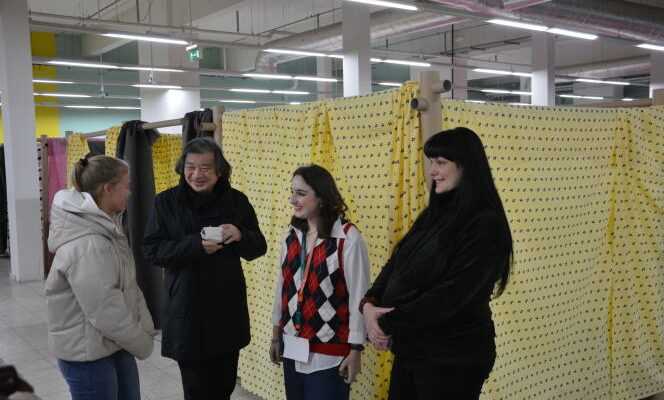On Saturday March 12, the municipality of Chelm, a town of 60,000 souls located in southeastern Poland, 24 kilometers from the border with Ukraine, opened its third emergency accommodation center in a disused hypermarket. of the Tesco chain. On the facade of the vast hangar, traces of the logo of this British group which left Poland at the time of Brexit are still clearly visible. Inside, the merchandise shelves have given way to a completely different organization of space. A large central void with chairs that serves as a public square, side enclaves to house the canteen, a playroom for the little ones, showers and toilets, an infirmary, a stand for pets… Between the two , six hundred beds were divided into units of two, four or six, isolated from each other by fabric curtains, themselves supported by long cardboard tubes fitted into each other according to a simple and ingenious system.
This structure was designed by Shigeru Ban, a Japanese architect known in France for having designed the Center Pompidou-Metz and the Musical Seine, and throughout the world for his humanitarian action. Adviser to the United Nations High Commissioner for Refugees since 1995, founder of the NGO Voluntary Architects’ Network, he has developed a whole range of emergency accommodation solutions and temporary buildings. A paper architecture that is light, quick to assemble, recyclable, inexpensive and, what is more, often surprisingly graceful. It earned him the prestigious Pritzker Prize in 2014.
Experimented for the first time in Japan, in 2004, after the Niigata Chuetsu earthquake, the PPS, Paper Tubes Partition System, this cardboard partition system that it deployed in the Tesco center aims to soften, as much as to make Perhaps, the experience of the refugees who land in these gigantic halls where they find themselves massed against each other without the slightest intimacy. “Privacy is a fundamental human right”, usually says the architect.
A gigantic transit zone
At the beginning of March, Shigeru Ban was still in Mayfield, Kentucky, a town reduced to smithereens by the tornadoes which ravaged this rural state of the United States, in December 2021. The discovery, on television, of the first images of Ukrainian refugees fleeing to Poland made him react immediately, and a week later he landed at Chelm. Known for her chalk career, for the reputation given to her by Yiddish literature – and, in particular, Isaac Bashevis Singer, in The Elders of Chelm (Denoël, 1994) —, for the massacres of the Jewish populations of which it was the theater several times in history, this city saturated, in winter, by the smoke of the coal which burns in the stoves, has become in a few days a gigantic transit area.
You have 62.94% of this article left to read. The following is for subscribers only.
